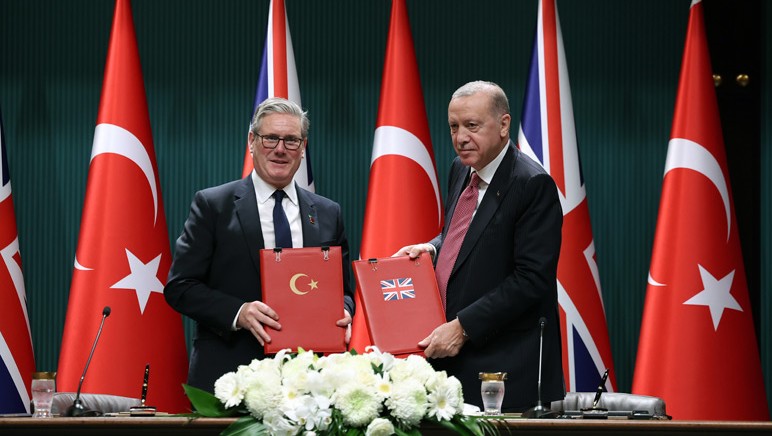A decade ago, Western European media often depicted President Recep Tayyip Erdoğan as a “merciless sultan”—a neo‑Ottoman Islamist drawing Turkey into the orbit of Russia and Iran, and standing squarely against Western values. Relations were frosty: invitations to European capitals were rare, Western leaders avoided Ankara, and support during the failed coup attempt of July 15, 2016 was tepid at best. While Erdoğan stressed that Turkey was vital for Europe’s security, European leaders focused primarily on democracy and human rights.
Today, that lens has shifted. Columnist Murat Yetkin notes that the political weight in Europe’s relationship with Ankara has moved “from democracy and rights to security.” This week illustrates the change: on October 27, British Prime Minister Keir Starmer met Erdoğan in Ankara to advance discussions on filling the Turkish Air Force’s fighter‑jet gap with Eurofighter aircraft—a move Britain has backed for years, with additional jets sourced from Qatar and Oman. Just days later, on October 29–30, German Chancellor Friedrich Merz arrived to promote Turkey’s inclusion in the new pan‑European security structure known as SAFE, while seeking to counter French‑backed Greek and Cypriot opposition to arms deals.
The economic and strategic agenda is broad. Alongside defense talks, both the UK and Germany are negotiating energy and mineral cooperation, particularly access to Turkey’s rare earth element reserves—an asset that grew in prominence following Erdoğan’s meeting with former U.S. President Donald Trump several years ago.
Yet despite the renewed focus on security, Turkey’s record on democracy and human rights has changed little. Prominent political figures such as Osman Kavala, Selahattin Demirtaş, and Figen Yüksekdağ remain imprisoned. Opposition leaders—including Istanbul Mayor Ekrem İmamoğlu, the CHP’s declared presidential candidate—face trials ranging from corruption to espionage, while several other CHP mayors await prosecution. Over the past decade, Turkey has fallen 38 places in the global Rule of Law Index, ranking 118th. Media outlets face mounting restrictions and financial penalties, and international investors frequently cite judicial reform as essential for sustainable investment.
Why, then, has Europe’s stance shifted despite this stagnant human‑rights record? Analysts point to seven factors. First, Erdoğan’s continued grip on power—including his re‑election in 2023 amid economic turmoil—has reshaped perceptions of his durability. Second, Turkey’s decisive enforcement of the 1936 Montreux Convention to close the Straits at the outset of the Russia–Ukraine war demonstrated strategic leverage. Third, a rapid expansion in domestic defense production, following Turkey’s removal from the F‑35 program, has altered regional military balances—Bayraktar TB2 drones have proven effective from Libya to Ukraine. Fourth, NATO budget pressures under Donald Trump prompted European capitals to place greater value on Turkey’s military role. Fifth, Ankara retains significant influence over potential changes to Syria’s governance. Sixth, the rise of nationalist right‑wing politics in Europe has muted domestic emphasis on democracy and rights. Seventh, as global tensions crystallize into a U.S.–EU rivalry with the China–Russia axis, security and trade have overtaken values in policy priorities.
For both Ankara and Europe, the relationship today rests less on shared democratic ideals than on mutual geostrategic needs—a shift likely to endure so long as security concerns dominate the continent’s agenda.
Photo: The Turkish Presidency
